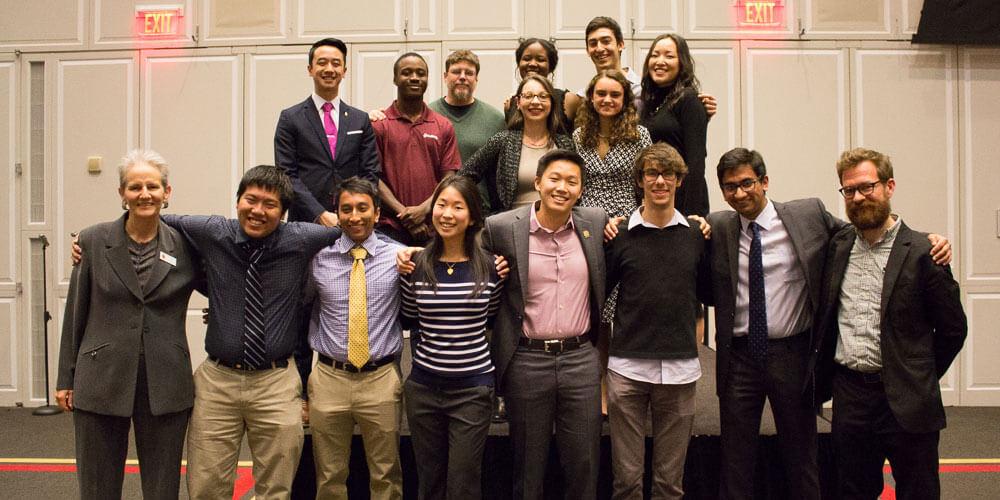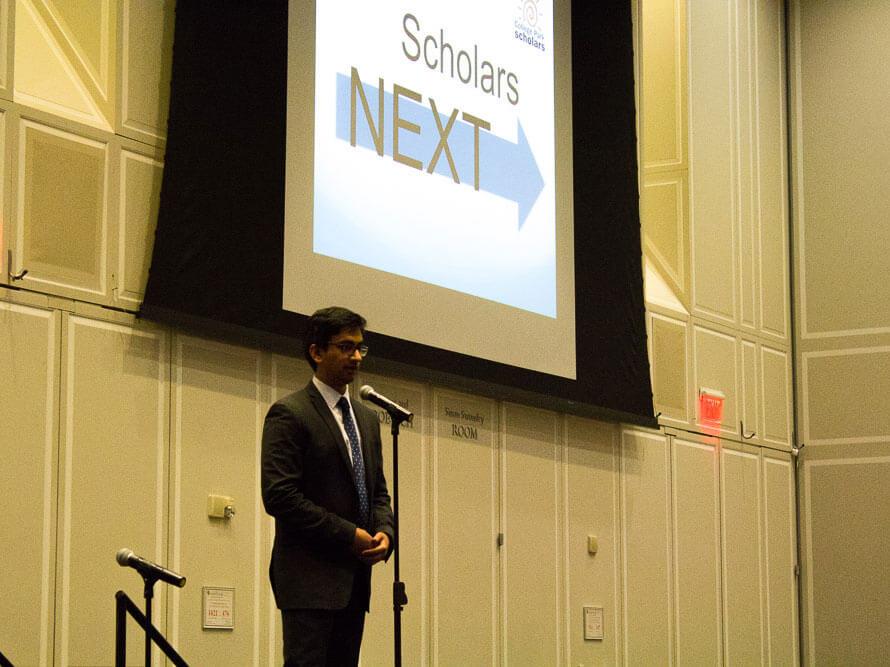
On Feb. 19, a group of seven College Park Scholars presented in the Samuel Riggs IV Alumni Center for the first-ever ScholarsNEXT event.
ScholarsNEXT is a student-run event that provides students with an opportunity to share their ideas about solving real-world problems. Presenters had to register for a class, which met every other week for an hour. Sponsored by the UMD SGA and the Office of Undergraduate Studies, Ananth Srivatsan was able to make his dream a reality in founding this event.
“These students are incredibly talented, and they have some, frankly, brilliant ideas,” Srivatsan, a Science, Technology and Society Scholar, said before introducing the first speaker, Public Leadership Scholar Aaron Pludwinski.
Pludwinski spoke about the importance of mastering creativity. He elaborated on his journey with his own company, which is a search engine that helps users find the right people for their projects. He encouraged the audience to change their mindsets about creativity.
“By putting in time and commitment every day, you can be successful at whatever you do,” Pludwinski said. “Constraints force you to fail, force you to learn, force you to be a little more creative.”
The second speaker was junior Arts Scholar Rebecca Gwira. Her speech focused on redefining the selfie, emphasizing that selfies should be used for art and self-activism. Her PowerPoint included pictures, artwork, and gifs that related to her presentation.
Gwira also pointed to artist Frida Kahlo, who was confident in expressing herself and her unconventional beauty and showed her brokenness and scars. She reiterated several times that self-confidence is not equivalent to narcissism.
Next, junior Media, Self and Society Scholar Kofie Yeboah shared his experiences with overcoming failure. After injuring his hamstring in high school and ending his track career and getting rejected by several on-campus publications at UMD, Yeboah still refused to give up. As a freshman, he took the initiative to found The Left Bench, a sports journalism website.
“I hope I am able to tell people that if… you believe that you can, I will bet on you 100 percent of the time,” said Yeboah in an interview. “There are always going to be people that deny you.”
Yeboah also expressed his gratitude for College Park Scholars and the Merrill College of Journalism.
“These two communities have done so much… in being supportive of everything that I do,” he said. “I love that at Maryland they encourage you to get involved. At other journalism schools, they make you wait two years to get involved extracurricularly.”
The fourth speaker was Arts Scholar Casey DeFrancesco who asked why art isn’t valued as much as other subjects in the education system. She insisted that the creative process and the scientific process are the same.
“But you can’t test the arts, and that’s the error of education today,” DeFrancesco said.

After the intermission, Arts Scholar Taylor Yano explained the connection between math and music. She suggested that the hate some students feel for math stems from the education system, arguing that “we should use our love of music to change the way we feel about math.” At the end of her speech, she shared a piece of music that she composed using a math function.
Public Leadership Scholar Ryan Wong followed Yano, speaking about the all-encompassing nature of depression. Using his best friend “Erin” as a symbol for his depression, he explained his toxic relationship with depression.
“Victims just want to get out of this chokehold grasp that [depression] has on you, but it’s much more complicated than just telling him to let go,” explained Wong. He finished his speech saying, “You will get through this because you’re stronger than you think you are… You’re definitely worth our time.”
Public Leadership Scholar Rebecca Goodridge closed out the night with her speech about how music is beneficial for senior citizens. She founded Vintage Voices at UMD, a club that performs sing-alongs for the elderly at nursing homes.
“Reminiscence can increase cognitive capacity,” explained Goodridge. “Music is a shared experience… used for socializing. It facilitates intergenerational connection… There is value to conversation sparked by music.”
Director of Science, Technology and Society Dr. David Tomblin anticipates that ScholarsNEXT will become an annual event. Tomblin was one of the mentors that coached the student speakers in a class setting. Along with Associate Director of College Park Scholars Dr. David Eubanks, Tomblin helped the Scholars prepare their speeches last semester.
“[ScholarsNEXT] is just a more individualized, special way of showcasing student projects and ideas,” said Tomblin. “I was proud of each and every one of them, and I think that the bond that we developed… was a very special thing.”
Scholars central staff is deliberating on how to potentially implement ScholarsNEXT in future years.
“They exceeded my expectations, and my expectations were pretty high,” Tomblin said. “We had to get something out there to get more buy-in, and I think that eventually this will become something that all programs will want to be involved in.”